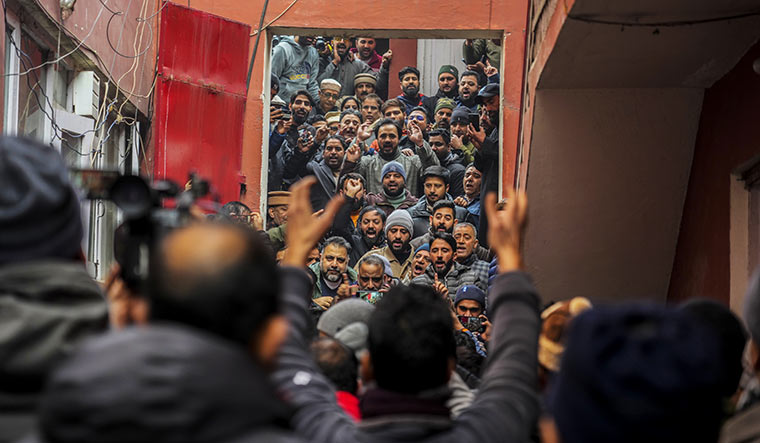THE GUJJARS and Bakerwals of Kashmir’s Pir Panjal region are at the centre of attention yet again. On December 21, the People’s Anti-Fascist Front, allegedly a proxy of Jaish-e-Mohammad, attacked two Army vehicles, killing four soldiers and injuring three.
In the aftermath, security forces apprehended eight men from Topa Pir, one of the villages where the Gujjars and Bakerwals live. Though five of them were released after protests by villagers, three―Safeer Ahmed, 37, Muhammed Showkat, 26, and Shabir Ahmed, 30―were found dead the following day. A video showing the men being tortured, allegedly by soldiers, led to widespread outcry throughout the Pir Panjal region, which spans the districts of Rajouri and Poonch. The National Conference, the Peoples Democratic Party and the Jammu and Kashmir Apni Party condemned the alleged custodial killings, demanding justice for the deceased. The government was quick to impose restrictions, cut the internet and announce compensation and job offers for the families of the men. The Army initiated an inquiry into the incident and three officers, including a brigadier, were transferred. Army Chief General Manoj Pande met senior commanders and soldiers and asked them to conduct operations professionally.
The death of the three men has shaken their families. Safeer’s brother Noor Ahmed, a Border Security Force head constable posted in Rajasthan, said, “His neck was broken and they also gave him electric shock. His death has shattered our lives. Who will take care of his four children and widow now?”
He said compensation would not bring his brother back. “We want justice; those who did it should be punished.”
Showkat’s uncle, Muhammad Sadiq, said the Army reached their village at 9.30am on December 22. “They took my nephew and another young man from our village,” he said. “Later, at noon, they took another, Shabir Ahmed.”
He said they got the bodies only at 2am the next day, thanks to the intervention of the deputy commissioner and superintendent of police. “If they had shot them, it would have been less painful,” he said. “We buried the bodies the next morning, and only the villagers could attend the funeral because of the restrictions.”
This was the second time civilians faced the blowback of an attack on security forces in Pir Panjal. On April 26, Mukhtar Hussain Shah, a farmer from Poonch’s Nar village, allegedly died by suicide days after he was taken for questioning in relation to an attack on security forces. His family and neighbours blocked the Jammu-Poonch highway, seeking a fair inquiry into the incident. Before his death, Shah alleged in a video that he and his family had been harassed. “I am not under pressure from the Army or the police or any villager,” he said in the video while holding a small bag in his hands that apparently contained a bottle of insecticide. An inquiry led by the additional deputy commissioner of Poonch concluded that Shah died after consuming poison. However, his family has contested these findings.
Such incidents have caused disaffection among the locals. On May 9, a villager, Anil Kumar, was shot in the leg by the Army for roaming suspiciously near the Line of Control. On December 16, two villagers were shot dead and another injured, leading to stone-throwing at an Army camp on the Jammu-Poonch highway. The Army blamed terrorists; villagers suspected the camp’s sentry.
After the abrogation of Article 370, Pir Panjal has become a new theatre of high-intensity terror attacks. The attacks on civilians have also contributed to tension in the region. On January 1, Dhangri village in Rajouri faced its first terror attack since the late 1990s. This year alone, 20 security forces personnel and 28 terrorists have been killed in encounters in the region.
Mistrust is in the air. The security forces believe that such high-precision attacks are not possible without local support. The Bakerwals, who move with their herds during summers, traverse the Pir Panjal range from Rajouri and Poonch to Shopian and Kulgam in south Kashmir. The rugged terrain, snaking rivers and dense forests of Pir Panjal offer cover to terrorists, aiding infiltration from Pakistan-occupied Kashmir into districts like Rajouri, Poonch and Pulwama. Experts said that such challenges could only be countered by better intelligence, for which the security forces need the help of the locals.
As per the 2011 census, the Gujjars and Bakerwals make up 15 lakh of the 1.25 crore population of Jammu and Kashmir. Activist-lawyer Guftar Chowdhry, however, said the census was carried out in April-May, when a large number of them were on the move with their herds. “We are patriotic people and will never help anyone plot against the country,” he said. “The government should not take any step like conferring ST status to non-tribals like the Paharis and some upper-caste groups. Such a move will harm our prospects in jobs and admissions.”
Observers fear that adopting a tough stance, particularly against the Gujjars and Bakerwals, could prove counterproductive in addressing the escalating security challenge in the region. This could further alienate these communities, especially as they are already miffed at the proposed expansion of the scheduled tribe status.
Ravinder Raina, Jammu and Kashmir BJP president, said the death of the three men would be investigated and responsibility fixed. “Gujjars and Bakerwals are my brothers and nobody will be spared if found involved,” he said. “This is a tragedy for all of us.”


